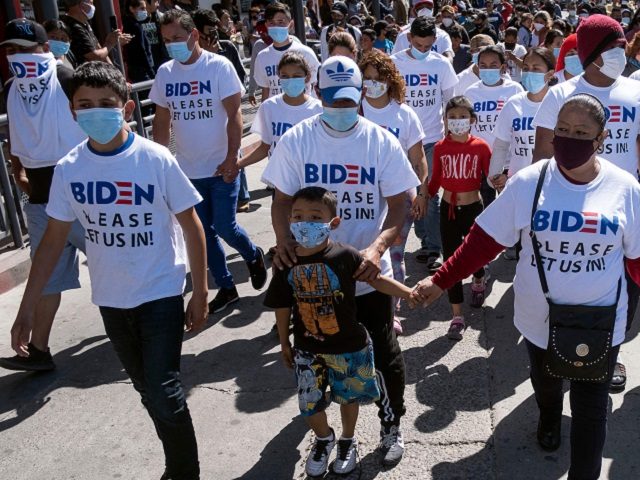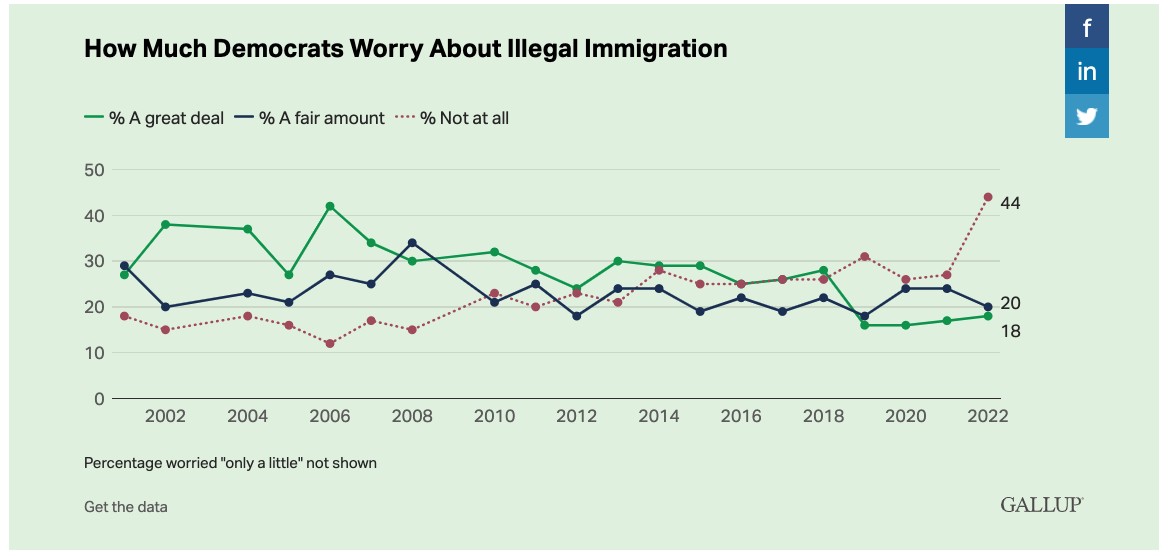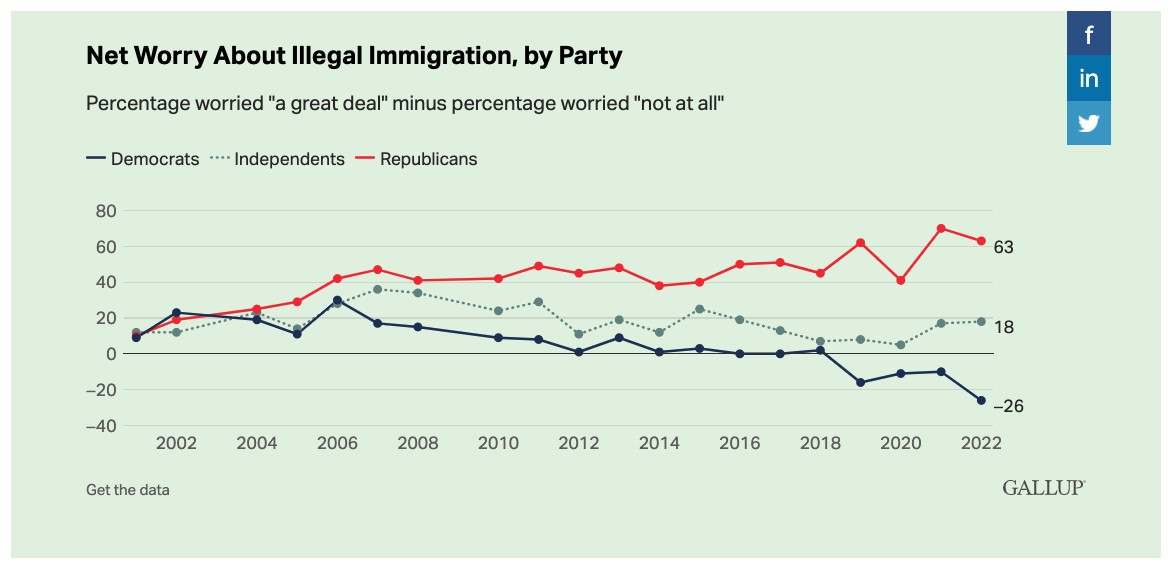Almost half of Democrats say they are “not at all worried” about President Joe Biden’s mass migration into Americans’ jobs and homes, according to a Gallup poll.
Forty-four percent of Democrats say they are “not at all” worried about illegal immigration, according to the poll of 1,017 adults, which was taken March 1-18.
Only 18 percent of Democrats — alongside 68 percent of Republicans and 39 percent of independents — say they worry “a great deal” about the rise of illegal immigration.
The poll shows that the Democrats’ woke base of university-educated progressives are sticking with Biden as his deputies extract a growing number of foreign workers, consumers, and renters from poor countries for use in the U.S. economy. Gallup reported:
[S]ince 2006, Democrats have become increasingly less concerned about illegal immigration, with the percentage saying they are “not at all concerned” overtaking the percentage concerned “a great deal” in 2019 and surging to a new high of 44% this year. By contrast, just 18% now say they are concerned a great deal, down from as much as 42% being this concerned in 2006 and 28% in 2018.
Biden’s massive inflow includes legal immigrants, long-term visa workers, economic migrants who are being allowed to take jobs while they file for asylum, plus illegal migrants who sneak past border guards.
The inflow is largely being ignored by the establishment TV news shows, even though it delivered roughly two migrants for every three U.S. births in 2021, according to federal data. The massive but largely hidden inflow floods the labor and housing markets, so cutting Americans’ wages and raising their rents. In turn, the wage cuts and spiked retail sales helped to spike Wall Street stocks.
The immigration inflow includes a growing number of white-collar workers for the jobs and homes sought by the Democrat-voting block of U.S. college graduates.
Overall, the poll shows that the two parties’ voters are splitting into pro- and anti-migration camps.
Gallup posted a graph showing the “net worry” for each of the two parties. The score is the percentage of each party who are worried about illegal migration, minus the “not at all worried” share.
The “net worry” in the GOP is 68 percent and is minus 26 points in the Democrats, creating an 89-point gap between the two parties. The “net worry” score among independents is almost exactly halfway between the two parties.
The Gallup poll, however, is only a “feelings” poll. The respondents were not told anything about the scale of current migration nor its impact on Americans’ jobs and wealth.
In contrast, Rasmussen reports regularly asks people about the pocketbook issues related to immigration. For example, every two weeks, Rasmussen asks:
When businesses say they are having trouble finding Americans to take jobs in construction, manufacturing, hospitality and other service work, what is generally best for the country? Is it better for businesses to raise the pay and try harder to recruit non-working Americans even if it causes prices to rise, or is it better for the government to bring in new foreign workers to help keep business costs and prices down?
In a poll taken on March 27-31, 64 percent of likely voters said it was “Better for businesses to raise the pay and try harder to recruit non-working Americans even if it causes prices to rise.”
Just 21 percent said it was “Better for the government to bring in new foreign workers to help keep business costs and prices down.”
The split among non-partisans was 65 percent to 18 percent, and among “moderates” was 63 percent to 23 percent.
The focus on pocketbook issues pushed Democrats’ response toward the low-immigration side, 58 percent to 29 percent.
Since at least 1990, the D.C. establishment has used a wide variety of excuses and explanations — for example, “Nation of Immigrants” — to justify its economic policy of extracting tens of millions of migrants and visa workers from poor countries to serve as legal or illegal workers, consumers, and renters for various U.S. investors and CEOs.
The self-serving economic strategy of extraction migration has no stopping point. It is brutal to ordinary Americans because it cuts their career opportunities, shrinks their salaries and wages, raises their housing costs, and has shoved at least ten million American men out of the labor force.

Immigrant families from Haiti walk from Mexico through a gap in the border wall into the United States on December 10, 2021, in Yuma, Arizona. (John Moore/Getty Images)
Extraction migration also distorts the economy and curbs Americans’ productivity, partly because it allows employers to use stoop labor instead of machines.
Migration also reduces voters’ political clout, undermines employees’ workplace rights, and widens the regional wealth gaps between the Democrats’ coastal states and the Republicans’ Heartland states.
An economy built on extraction migration also alienates young people and radicalizes Americans’ democratic, compromise-promoting civic culture because it allows wealthy elites to ignore despairing Americans at the bottom of society.
The economic strategy also kills many migrants, exploits poor people, splits foreign families, and extracts wealth from the poor home countries.
The extraction migration policy is backed by progressives who wish to transform the United States from a society governed by European-origin civic culture into a progressive-led empire of competing identity groups. “We’re trying to become the first multiracial, multi-ethnic superpower in the world,” Rep. Ro Khanna (D-CA), told the New York Times on March 21. “It will be an extraordinary achievement … we will ultimately triumph,” he insisted.
The welcome for migrants “is also a boost to US economy and will help stabilize the economy of Cameroon through increased remittances,” claimed Douglas Rivlin, a progressive spokesman for America’s Voice, a business-backed pro-migration group.
Not surprisingly, the wealth-shifting extraction migration policy is very unpopular, according to a wide variety of polls.
The polls show deep and broad public opposition to labor migration and the inflow of temporary contract workers into jobs sought by young U.S. graduates.
The opposition is growing, anti-establishment, multiracial, cross-sex, non-racist, class-based, bipartisan, rational, persistent, and recognizes the solidarity that Americans owe to one another.



COMMENTS
Please let us know if you're having issues with commenting.